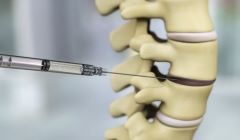Allogeneic discogenic cell therapy was well tolerated and produced clinically meaningful, statistically significant improvements in low back pain, function, and quality of life by 12 weeks following intradiscal injection

During treatment, a single dose of IDCT is injected into the painful disc percutaneously
DiscGenics announced the presentation of positive interim data from its ongoing Phase 1/2 clinical trial of IDCT (rebonuputemcel), an allogeneic injectable discogenic cell therapy for degenerative disc disease (DDD), at Spine Summit 2022.
The primary efficacy endpoint of the study (n=60) was achieved, with statistically significant improvement in back pain observed in the high dose IDCT group. For these patients, low back pain scores improved >30% as measured on a 100mm Visual Analog Scale (VAS) at Weeks 12 (–54.53% [–69.46, –39.60], p=0.0056), 26 (–50.94% [–66.10, –35.78], p=0.0140), and 52 (–62.79% [–77.13, –48.46], p=0.0005).
At these same timepoints, high dose IDCT also produced clinically meaningful, statistically significant improvements in function as measured by the Oswestry Disability Index (ODI) and quality of life as measured by the EQ-5D Index Score.
Importantly, no subjects in the IDCT treatment groups have experienced serious treatment-emergent adverse events (TEAEs).
"We are very encouraged by this interim clinical data. Not only are we seeing a strong safety profile and dramatic pain reduction with a dose response that occurs early and continues at the one-year time point in patients who received the high dose IDCT, we're also seeing rapid, significant, and durable improvements in function and quality of life," said Kevin T. Foley, M.D., Chief Medical Officer for DiscGenics and Chairman of Semmes-Murphy Neurologic & Spine Institute. "As we await the 78-week and 104-week final data readouts, we hope to see sustained and meaningful improvement in each of these life-changing measures."
The improvements in pain, function, and quality of life at one-year post-injection exceeded what are known as minimum clinically important differences (MCIDs), which reflect changes in a clinical intervention that are meaningful for the patient.
DiscGenics is in the process of analyzing data from patient follow-up visits at weeks 78 and 104. The company intends to submit the full dataset to the U.S. Food & Drug Administration's (FDA) Office of Tissues and Advanced Therapies (OTAT) for consideration in an End of Phase 2 meeting targeted for the second half of 2022.
In the meantime, DiscGenics is continuing to scale up its in-house manufacturing capabilities so it will have cells ready for future clinical and/or commercial application, depending on the outcome of the FDA's review of the data.

Subscribe To Our Newsletter & Stay Updated